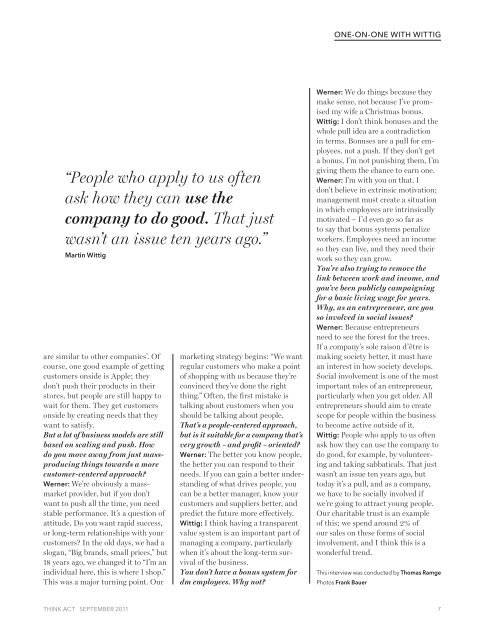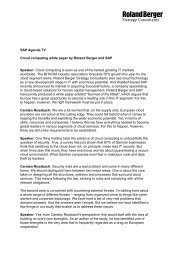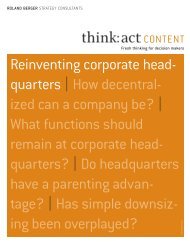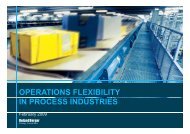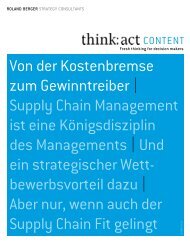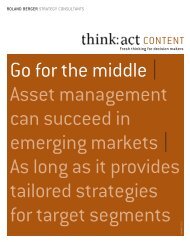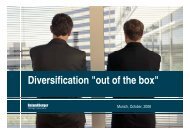think: act magazine No. 17 - Size Matters - Roland Berger
think: act magazine No. 17 - Size Matters - Roland Berger
think: act magazine No. 17 - Size Matters - Roland Berger
Create successful ePaper yourself
Turn your PDF publications into a flip-book with our unique Google optimized e-Paper software.
One-on-one with Wittig“People who apply to us oftenask how they can use thecompany to do good. That justwasn’t an issue ten years ago.”Martin Wittigare similar to other companies’. Ofcourse, one good example of gettingcustomers onside is Apple; theydon’t push their products in theirstores, but people are still happy towait for them. They get customersonside by creating needs that theywant to satisfy.But a lot of business models are stillbased on scaling and push. Howdo you move away from just massproducingthings towards a morecustomer-centered approach?Werner: We’re obviously a massmarketprovider, but if you don’twant to push all the time, you needstable performance. It’s a question ofattitude. Do you want rapid success,or long-term relationships with yourcustomers? In the old days, we had aslogan, “Big brands, small prices,” but18 years ago, we changed it to “I’m anindividual here, this is where I shop.”This was a major turning point. Ourmarketing strategy begins: “We wantregular customers who make a pointof shopping with us because they’reconvinced they’ve done the rightthing.” Often, the first mistake istalking about customers when youshould be talking about people.That’s a people-centered approach,but is it suitable for a company that’svery growth – and profit – oriented?Werner: The better you know people,the better you can respond to theirneeds. If you can gain a better understandingof what drives people, youcan be a better manager, know yourcustomers and suppliers better, andpredict the future more effectively.Wittig: I <strong>think</strong> having a transparentvalue system is an important part ofmanaging a company, particularlywhen it’s about the long-term survivalof the business.You don’t have a bonus system fordm employees. Why not?Werner: We do things because theymake sense, not because I’ve promisedmy wife a Christmas bonus.Wittig: I don’t <strong>think</strong> bonuses and thewhole pull idea are a contradictionin terms. Bonuses are a pull for employees,not a push. If they don’t geta bonus, I’m not punishing them, I’mgiving them the chance to earn one.Werner: I’m with you on that. Idon’t believe in extrinsic motivation;management must create a situationin which employees are intrinsicallymotivated – I’d even go so far asto say that bonus systems penalizeworkers. Employees need an incomeso they can live, and they need theirwork so they can grow.You’re also trying to remove thelink between work and income, andyou’ve been publicly campaigningfor a basic living wage for years.Why, as an entrepreneur, are youso involved in social issues?Werner: Because entrepreneursneed to see the forest for the trees.If a company’s sole raison d’être ismaking society better, it must havean interest in how society develops.Social involvement is one of the mostimportant roles of an entrepreneur,particularly when you get older. Allentrepreneurs should aim to createscope for people within the businessto become <strong>act</strong>ive outside of it.Wittig: People who apply to us oftenask how they can use the company todo good, for example, by volunteeringand taking sabbaticals. That justwasn’t an issue ten years ago, buttoday it’s a pull, and as a company,we have to be socially involved ifwe’re going to attr<strong>act</strong> young people.Our charitable trust is an exampleof this; we spend around 2% ofour sales on these forms of socialinvolvement, and I <strong>think</strong> this is awonderful trend.This interview was conducted by Thomas RamgePhotos Frank BauerTHINK Act september 2011 7


